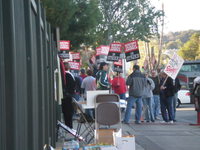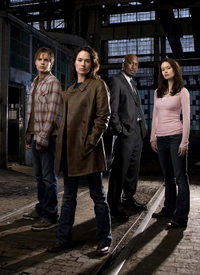The AMPTP took out more full-page ads in national newspapers today in an attempt to cast the WGA as irrational, unreasonable, and greedy. The problem is that the AMPTP can’t do that and tell the truth at the same time. So guess how they dealt with the problem.
Here is how Patric Verrone, president of the WGA, responded to the latest ads:
* They say that technology and the Internet is rapidly
changing how Hollywood works. This is true, which is why we need a new formula to
determine compensation.
* They say that writers are already paid residuals for
digital downloads. It’s true some companies are trying to pay us for downloading shows we’ve
created at the abysmal DVD rate of a third of a penny per dollar earned by the companies. But we have
never agreed to this formula, and we have initiated arbitration.
* They say we are asking for a 700% increase over
what we currently receive for digital downloads. This is more than misleading. Again, some companies are trying to pay us the DVD rate. And we are asking to receive
2.5 cents per dollar. The only way to characterize our request as a 700% increase is if you accept as a
given the low ball amount they’re trying to foist on us.
* They say they have offered to pay us a percentage of the
revenue from Internet streaming of shows we’ve created. Here’s the truth about their
offer. We would get no share of revenue for the first six weeks that our shows air. In other words, they’re offering us a share of revenue after there is little revenue left.
* They say that no labor agreement in history has given
writers, actors, or directors a portion of advertising dollars. Nowhere in any of our proposals have we
ever asked for a share of ad dollars. As with every residual, we are asking for a share of the revenue
the corporations receive.
The AMPTP is dealing with the issues by spending lots of money on misleading, full-page ads in national newspapers. The WGA would rather deal with the issues by talking about them over a negotiating table.





